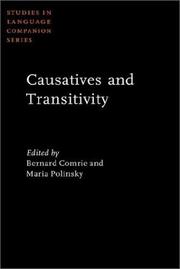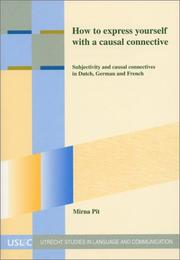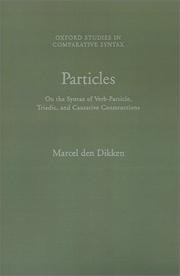| Listing 1 - 3 of 3 |
Sort by
|

ISBN: 9027230269 1556193750 1283092700 9027285861 9786613092700 9789027230263 9789027285867 9781556193750 Year: 1993 Volume: 23 Publisher: Amsterdam Benjamins
Abstract | Keywords | Export | Availability | Bookmark
 Loading...
Loading...Choose an application
- Reference Manager
- EndNote
- RefWorks (Direct export to RefWorks)
This volume brings together 18 typological studies of causative and related constructions (transitivity, voice, other expressions of cause) by 19 scholars from North America, Western Europe, and Russia. The inspirations for the volume is the pioneering work on causative constructions by the Leningrad Typology Group; several of the contributors have close connections to the charter members of that group, others have appreciated this work from a distance. The volume as a whole is based on the concept of causative constructions as embracing both morphology and syntax, with an important semantic c
Causative (Linguistics) --- Grammar, Comparative and general --- Transitivity --- Causaliteit (Taalwetenschap) --- Causality (Linguistics) --- Causalité (Linguistique) --- Causatiefvormen (Taalwetenschap) --- Causatieve constructies (Taalwetenschap) --- Causatieven (Taalwetenschap) --- Causatif (Linguistique) --- Causative constructions (Linguistics) --- Causatives (Linguistics) --- Oorzakelijkheid (Taalwetenschap) --- Grammar --- Grammar [Comparative and general ] --- Linguistics --- Philology --- Causal relations (Linguistics) --- Transitivity. --- Causative constructions --- Syntax --- Grammar, Comparative and general - Transitivity

ISBN: 9042008563 9789042008564 9789004458567 9004458565 Year: 2003 Volume: 17 Publisher: Amsterdam Rodopi
Abstract | Keywords | Export | Availability | Bookmark
 Loading...
Loading...Choose an application
- Reference Manager
- EndNote
- RefWorks (Direct export to RefWorks)
The Dutch, German and French languages display a variety of regularly used connectives all of which introduce causes, arguments or reasons, such as Dutch omdat, want and aangezien, German weil, denn and da , and French parce que, car and puisque. Why should languages have different connectives to express the notion of backward causality? The central argument developed in this book is that different connectives express different degrees of subjectivity. In a series of corpus analyses it is shown that the degree of subjectivity of the main participant involved in the causal relation strongly predicts the occurrence of one or another connective. Hence, language users have at their disposal connectives of varying degrees of subjectivity. In an analysis of judiciary sentences, it is revealed that speakers are actually sensitive of this semantic distinction, and sometimes even exploit it for their communicative purposes: in order to conceal their subjective involvement, judges prefer objective over subjective connectives. This volume makes a contribution to the study of language in use, by applying empirical methods to authentic language data. It will be of interest to anyone concerned with discourse coherence, perspective and subjectivity, corpus linguistics and cross-linguistic analyses.
French language --- English language --- Comparative linguistics --- Grammar --- German language --- Causaliteit (Taalwetenschap) --- Causality (Linguistics) --- Causalité (Linguistique) --- Causatiefvormen (Taalwetenschap) --- Causatieve constructies (Taalwetenschap) --- Causatieven (Taalwetenschap) --- Causatif (Linguistique) --- Causative (Linguistics) --- Causative constructions (Linguistics) --- Causatives (Linguistics) --- Oorzakelijkheid (Taalwetenschap) --- Grammar, Comparative and general --- Connectives. --- 801.56 --- Syntaxis. Semantiek --- 801.56 Syntaxis. Semantiek --- Grammar [Comparative and general ] --- Connectives --- Causatif (linguistique) --- Grammaire comparée --- Allemand (langue) --- Français (langue) --- Néerlandais (langue) --- Sémantique --- Syntaxe --- Conjonctions (linguistique) --- Connecteurs --- Connecteurs (linguistique) --- Connecteurs. --- Causitive (Linguistics) --- Connecteurs (Linguistique) --- Connectives (Linguistics) --- Sentence connectors --- Function words --- Syntax --- Linguistics --- Philology --- Grammar, Comparative and general - Connectives.

ISBN: 0195091353 0195091345 1280534931 0195358007 9780195358001 9780195091359 9780195091342 9781280534935 9780195091342 0197722148 Year: 1995 Volume: *5 Publisher: New York Oxford University Press
Abstract | Keywords | Export | Availability | Bookmark
 Loading...
Loading...Choose an application
- Reference Manager
- EndNote
- RefWorks (Direct export to RefWorks)
In this title, the author investigates the distribution and placement of verbal particles, which are words that do not change their form through inflection and do not fit easily into the established system of parts of speech. He analyses data from Norwegian, English, Dutch, German, and other languages.
Causaliteit (Taalwetenschap) --- Causality (Linguistics) --- Causalité (Linguistique) --- Causatiefvormen (Taalwetenschap) --- Causatieve constructies (Taalwetenschap) --- Causatieven (Taalwetenschap) --- Causatif (Linguistique) --- Causative (Linguistics) --- Causative constructions (Linguistics) --- Causatives (Linguistics) --- Oorzakelijkheid (Taalwetenschap) --- 801.56 --- Grammar, Comparative and general --- -Grammar, Comparative and general --- Causal relations (Linguistics) --- 801.56 Syntaxis. Semantiek --- Syntaxis. Semantiek --- Comparative grammar --- Grammar --- Grammar, Philosophical --- Grammar, Universal --- Language and languages --- Philosophical grammar --- Linguistics --- Philology --- Particles --- Syntax --- Verb --- Causative constructions --- Grammar, Comparative --- Causative (Linguistics). --- Particles. --- Syntax. --- Verb. --- Particules (Linguistique) --- Syntaxe --- Verbe (Linguistique) --- Particles (Grammar) --- Verb phrase --- Verbals --- Reflexives --- Function words --- Grammar [Comparative and general ] --- Grammar, Comparative and general Particles --- Grammar, Comparative and general Syntax --- GRAMMAIRE COMPAREE ET GENERALE --- Grammaire comparée et générale --- PARTICULES --- VERBE
| Listing 1 - 3 of 3 |
Sort by
|

 Search
Search Feedback
Feedback About UniCat
About UniCat  Help
Help News
News